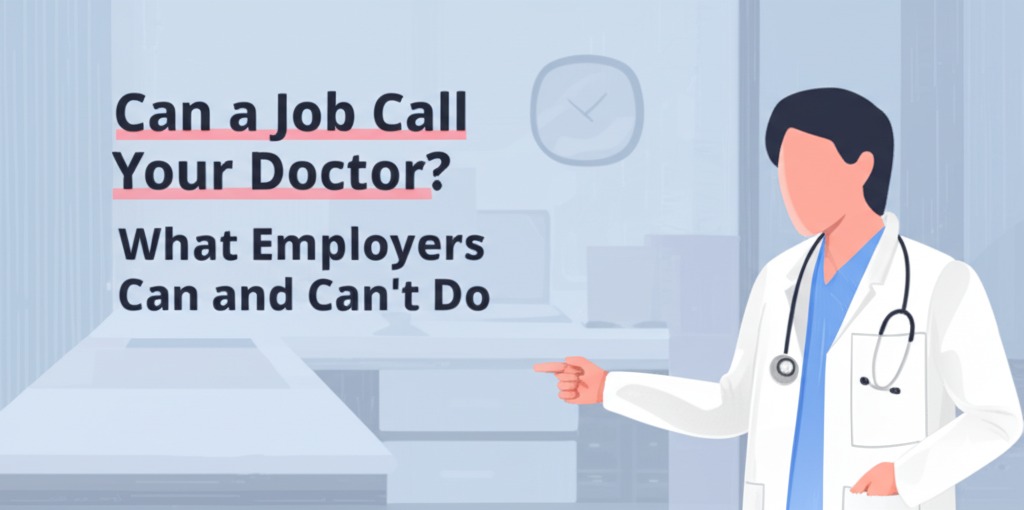
When you’re out sick from work or dealing with a medical issue, it’s natural to wonder just how much your employer can find out—and whether they can contact your doctor directly. Can a job call your doctor? It’s a valid concern, especially in today’s world where privacy and professional boundaries are more important than ever.
In this article, we’ll break down the laws and practices that protect your medical information, explain what employers are legally allowed to do, and provide guidance on what to do if you think your rights have been violated.
Understanding Medical Privacy in the Workplace
The Role of HIPAA
The Health Insurance Portability and Accountability Act (HIPAA) is a federal law designed to protect your private health information. Under HIPAA:
- Doctors and healthcare providers cannot disclose your health information to anyone—including your employer—without your written consent.
- This applies to everything from your diagnosis to your treatment plan.
So, in most cases, your job cannot call your doctor and obtain private details about your health without violating federal law.
When Can an Employer Contact a Doctor?
While HIPAA restricts doctors from sharing your medical details, there are some scenarios where your employer may contact your doctor—but with strict limitations.
1. With Your Written Consent
Your employer can request medical documentation (such as for FMLA leave or disability accommodation). In such cases:
- You may be asked to sign a release form.
- This form allows your employer or a third-party administrator to verify your condition—but not receive detailed medical records.
Important: Signing a release is voluntary. However, not signing could impact your eligibility for certain benefits or leave.
2. For Work-Related Health Evaluations
If your job involves safety-sensitive duties or physical demands, your employer might require:
- A fitness-for-duty exam, conducted by a medical professional.
- A second opinion or medical review, especially in cases of workers’ compensation claims.
Even then, your employer usually deals with a company-appointed physician—not your personal doctor.
What Employers Can Ask For
While they can’t freely access your medical history, employers can require specific information to manage absences or accommodations.
Examples of Acceptable Requests:
- A note confirming you were seen by a doctor.
- The expected duration of your illness or recovery.
- Whether you are cleared to return to work with or without restrictions.
What they can’t ask for:
- Details about your diagnosis.
- Your medical history.
- Any unrelated health issues.
Employers must also keep your health information confidential and separate from your personnel file.
Protections Under the Americans with Disabilities Act (ADA)
The ADA further protects employees from discrimination based on medical conditions or disabilities.
Under the ADA:
- Your employer cannot ask about medical conditions unless it’s job-related and consistent with business necessity.
- Any medical inquiries must be limited in scope and used strictly for accommodation or safety purposes.
If you disclose a disability, your employer must engage in an interactive process to determine reasonable accommodations.
Can Your Job Verify a Doctor’s Note?
Yes, but there are limits.
Your employer is allowed to:
- Call the doctor’s office to verify that a note is genuine (e.g., checking the date and whether the visit occurred).
- Confirm the doctor’s credentials.
They cannot ask for specific medical details during this verification. Receptionists and office staff are trained to provide only basic confirmation without violating privacy laws.
What To Do If You Suspect a Violation
If you believe your employer inappropriately contacted your doctor or accessed private information:
Take These Steps:
- Request a written explanation of why they contacted your provider.
- Check if you signed any medical release forms.
- File a complaint with:
- Your HR department.
- The U.S. Department of Health and Human Services (for HIPAA violations).
- The Equal Employment Opportunity Commission (for ADA violations).
You also have the right to consult an employment attorney if you feel your privacy was breached.
Tips to Protect Your Privacy at Work
- Only provide the information required—not more.
- If asked for medical details, ask how the information will be used and who will see it.
- Read all documents carefully before signing any medical release.
- Speak with your healthcare provider about what they can share.
Remember: It’s your right to protect your medical information.
Final Thoughts: Know Your Rights
So, can a job call your doctor? Technically, yes—but only to verify limited information and only with your permission or in very specific circumstances. Federal laws like HIPAA and the ADA are in place to safeguard your medical privacy and ensure that your employer can’t overstep their bounds.
Knowledge is power. By understanding your rights and setting boundaries, you can maintain both your privacy and your professionalism in the workplace.

Andre Cuevas provides career insights, job search strategies, and professional advice to help individuals navigate the job market and achieve their career goals.





